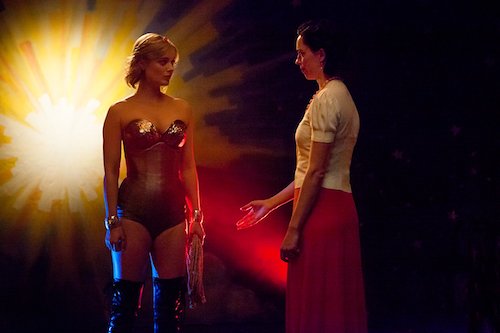The true story of Wonder Woman, in theaters tonight

Before Jill Lepore's The Secret History of Wonder Woman landed on the bestseller lists, Wonder Woman's origins were a deep nerd trivia cut. But now, pretty much everyone knows Wonder Woman was created by a disgraced professor named William Moulton Marston who was part of a triad relationship, and that with his wife he invented the lie detector. Now that it's common knowledge, the character's unique backstory has become a part of Wonder Woman's appeal.
And tonight, just a few months after the very first Wonder Woman movie released in theaters became a global smash hit, a smaller and more intimate Wonder Woman film is being released in theaters around the country. Professor Marston and the Wonder Women is a biopic about the man who created the character, and the two women who made his success possible. Best of all, the biopic is written and directed by a woman named Angela Robinson; not even five years ago, it's easy to imagine this story being mangled into a mess of male gaze and bad sexual politics by a well-intentioned but tone-deaf male director.
Because it basically amounts to a relationship drama, Women is a film that succeeds or fails based on its cast. On that front, it's a tremendous success. Luke Evans plays Marston as an ambitious and goofy man, a born lecturer who's convinced of his own greatness but puts that ego in service of the peace-loving matriarchy he believes is inevitable. He's just damaged enough to reveal his haunted past, but he's chipper enough that you can't feel sorry for him.
As Elizabeth Marston, Rebecca Hall is Evans's grounded better half. She's competent where he's lazy. She's pragmatic where he's dreamy. Hall doesn't just play Marston as a killjoy, or the nagging wife. She's got goals of her own, and she's madly in love with her husband. And both Marstons fall deeply in love with Olive Byrne (Bella Heathcote,) a comely and kind-hearted student who builds the perfect understanding between their two outsized personalities.
Together, the three actors forge a finely balanced triangle of seduction, aggravation, and finally genuine appreciation. The scenes where they create ground rules for their relationship are among the most interesting in the film. Heathcote and Hall both create characters that, when combined, form what Evans's Marston calls "the perfect woman," which he later translates into his idealized comic book hero.
Women does suffer from the inevitable biopic flaws: the soundtrack is noodly and generic. Biopic cliches run through the film: as soon as a character coughs once, for instance, you know you're going to witness their long and painful decline from a horrible disease. And the structure of the film is awkward, with plenty of fits and starts. The three don't become romantically entangled until the middle of the movie, and Wonder Woman doesn't show up until very late in the film. A framing device depicting the religious crusade to ban Wonder Woman comics is striking — a neighborhood comic-book-burning scene will churn your stomach — but ultimately goes nowhere.
In the end, if you're a Wonder Woman fan, you'll probably enjoy Women a great deal. Robinson's script indicates her clear love of the material, and her direction proves that she cares deeply about bringing the complex relationship behind the character to her movie. But if the character doesn't do anything for you, you'll likely lose interest in Women around the time that Marston first decides to write the comic. That's your loss. This is not the best comic book movie you'll see all year, but it's definitely the one with the most compelling relationship storyline.